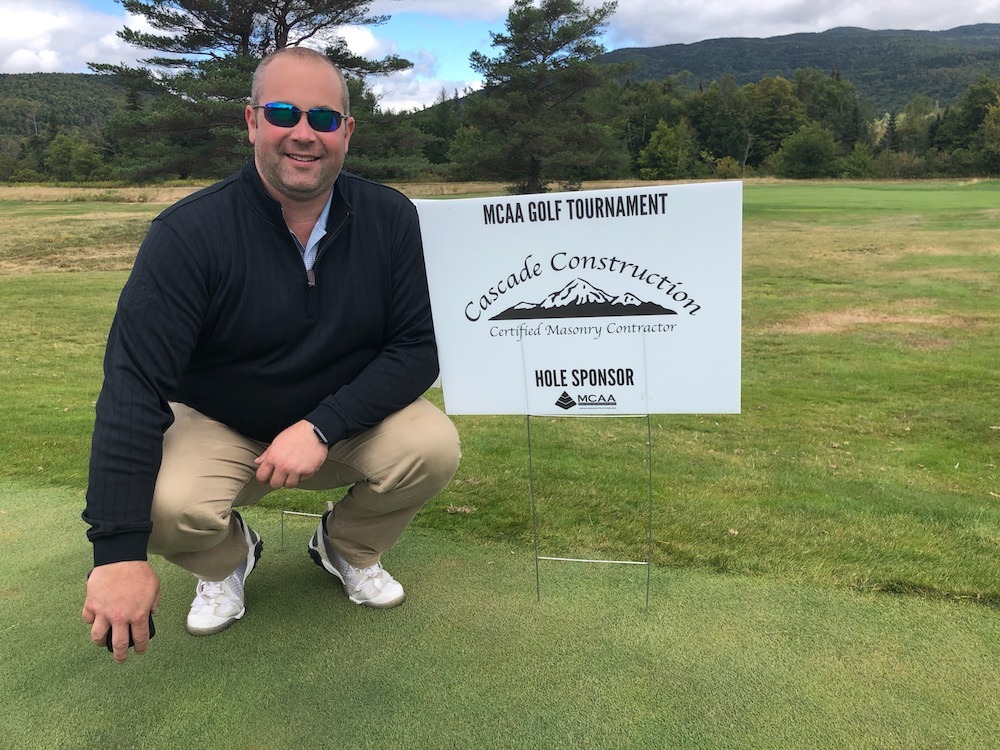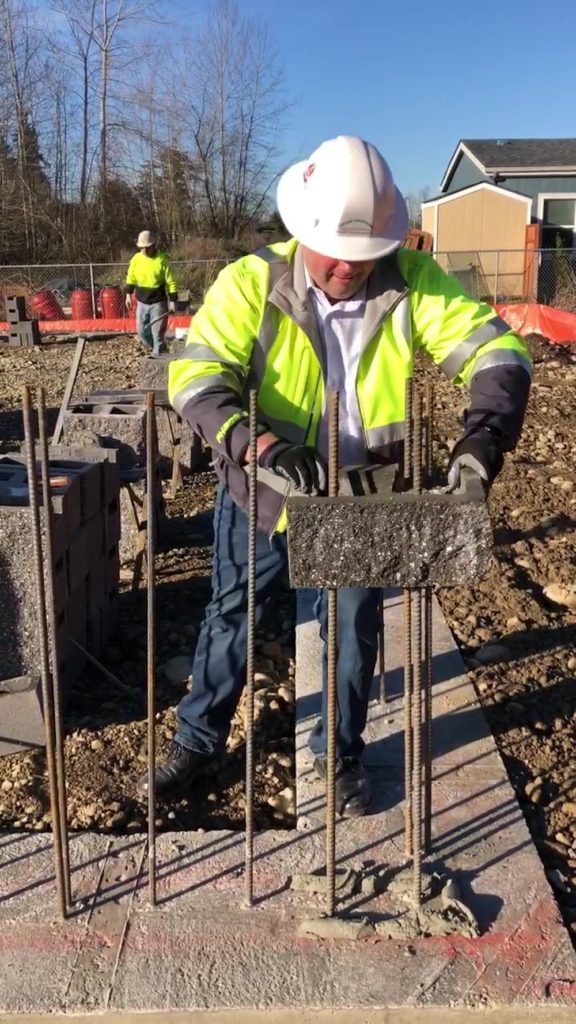GEN NXT: Ron Adams
Words: MASONRY Magazine
Photos: Ron Adams
Editor’s Note: We are starting the year off with a GEN NXT interview with Ron Adams, President of Cascade Construction Co. Inc. in Lakewood, WA. Ron has been in the masonry industry all of his life and enjoys being a part of it. We want to thank him for talking with us, and JagClamp for sponsoring this series.
Masonry Magazine: Tell us a little bit about yourself.
Ron Adams: I am 41, and a mason contractor who has been in the business my entire life. I am the owner/partner in Cascade Construction.
M.M.: How did you get started in the masonry industry?
R.A.: My uncle was a bricklayer, and he approached my dad, who was a small contractor and did a little bit of everything, and said we should start doing masonry work, and that was the start of what we do today.
M.M.: Very cool! So how old were you when that happened?
R.A.: I was 21.
M.M.: What is it like working with your family?
R.A.: Working with family is challenging, and it is also rewarding. You have all the personal dynamics of things and the business dynamics of things. Sometimes personal things affect business life, or business affects personal life. But ultimately, when you are working with family, at least you are around people that you care about and you trust, that is always looking out for the best interests of the company even if people have different ideas of how that might look.

M.M.: Any particular challenges to working with family?
R.A.: I think being very young when I started in the business, coming into the office right away and learning how to estimate and do other things like that. It was always challenging working with my uncle, who is 20 years older than me, and my dad was older than me, and I’m the kid — so getting past being the kid, to being respected for knowing what I’m doing.
M.M.: Did you do a formal apprenticeship?
R.A.: I did not. I worked with my dad growing up and have worked with him on various projects throughout my childhood. I also worked around the yard in junior high and high school. As I have always been in the masonry business, I never did a formal apprenticeship, although I did serve 15 years on our Apprenticeship Committee here locally.
M.M.: Did you always want to work in this industry or a similar type of industry?
R.A.: I always wanted to be in the construction industry. I didn’t know specifically masonry when I was a kid. But, I think now, looking back on it, this industry fits me really well and really is a good niche industry to be in.
M.M.: What about it is a good fit for you?
R.A.: I like masonry products, I like brick, block, stone, natural products, and what we are able to do today with them. Their unique uses really complement buildings, architecture, and design, and I think it is a really good product to put on buildings, both for sustainability and architecturally.
M.M.: How did you get from being 21 and working with your uncle and dad to being the head of the company today?
R.A.: Lots and lots of work. A part of it was, I’m the company’s oldest employee today, not oldest in age, but I’ve been here the longest. My uncle is retired, my dad is retired, but when we started hiring bricklayers and hod carriers in the early 2000s I was already at the company. So, I was dealing with people that were older than me, but not people that had been there longer than me.
I was able to work through that, and it was the natural progression when my dad was ready to retire and step back from the day-to-day of it. We also brought my brother in to work for us about 12-13 years ago now, and when we promoted him to Vice President, it was time for me to be the president.
M.M.: How is it working with your brother?
R.A.: That’s a whole new set of challenges, but it’s good, and we both respect what each other does in the company. He runs our estimating/preconstruction and is our lead estimator, as well as vice president of our company. So he handles most of the things in that area, we collaborate on all the bids that we put out because we believe in two sets of eyes on everything. Everybody makes mistakes and two sets of eyes and collaboration make for successful projects, and it works.
M.M.: What does a day-to-day routine look like for you?
R.A.: When you’re the owner and president of a company, there is no average day. I normally get into the office around 7, I go through my emails from the night before, take care of general paperwork until 8 or 9, and then normally I’m off. I go over to our warehouse and meet with our equipment manager and see what’s going on there logistically, and check on equipment and things of that nature.
Sometimes I’ll do those things in reverse order, I’ll go over there first and then come in, but those are my first two things. Then we’ll review any bids for the day and upcoming bids that are going on. Next, I’ll spend some time either through contract review, project review, analyzing where jobs are progress wise, reviewing daily reports. We also will have any meetings with staff in the afternoon, change order reviews with our project managers, or any other issues that come up during the day.

M.M.: So you would say that the majority of the day is spent in the office?
R.A.: I try to get out to jobsites at least twice a month. I try to visit jobsites, it doesn’t always happen that way, but I try to get out there, I pick a day and say I’m going to go there and will be gone for the day. But most of the time I do spend my time in the office.
We have a general superintendent, his job is to go around and look at the jobsites and review stuff and go to preconstruction meetings and things like that, so my job is to look at moving the business forward and business development things, and how can we be better as a company, both internally and externally.
M.M.: Where do you see yourself in 5 years?
R.A.: Well, we’re looking to bring on additional project management staff, so I hope in 5 years I’m in the same position. But maybe working a few fewer hours every week or every day, I’d like to take a few more vacations maybe and spend a little more time away from the office instead of being here every day.
M.M.: What does it mean to you that you are continuing the legacy of your family’s business?
R.A.: It’s important. I recently found out my great grandfather was a bricklayer, which is something I didn’t know until just a couple of days ago. Actually, my grandfather was a hod carrier, and that is how my uncle got into the business and how my dad became interested in the business. But I did not know that my great grandfather was a bricklayer, so it’s important to continue this legacy.
It’s awesome that I am business partners with my brother and my dad, and that my brother and I are able to take something and grow it way beyond what my dad ever thought about or imagined. It is also good to be able to help my parents out, support them in their retirement. If they want to do something, they can do it, and don’t have to worry about finances and things of that nature.
M.M.: How has your experience been when working with younger people in the industry? You mentioned that you’ve been hiring recently and you started taking over hiring new people, what is that like for you?
R.A.: Well, apprenticeship is very important, and that was one of the reasons I spent 15 years in apprenticeship, and on the apprenticeship committee locally. Our company has always run a very high percentage of apprentices. We have several employees that have worked with us as apprentices that are now foremen. We have several more employees that worked with us as apprentices that are going to become foremen that do some smaller projects and some of our service work. It is important that we’re bringing people up. It is important that we are training them in our trade and craft, giving them the opportunity to grow as well.
The only way that we can grow our company is through apprenticeship because there aren’t a million bricklayers out there beating down our door saying we want to come work for you. We have to go out there and find workers, and so when we find and train them, it allows us to do more projects. We need to train at a higher rate. Our goal is to train at a rate that exceeds our attrition rate.
M.M.: Do you have any advice for someone looking to work in the masonry industry for the first time?
R.A.: Show up to work every day, and have reliable transportation. If you don’t get to work every day, you won’t stay working. If you show up every day and you work hard, you can succeed. It takes no talent to be on time.
M.M.: What benefits have you experienced through your MCAA membership?
R.A.: Probably the biggest thing is the camaraderie, the friendships that I’ve developed through the MCAA with other contractors throughout the country, from a personal perspective more than anything else. From a professional business perspective, there are some very good things, the Silica Train the Trainer course, the silica training classes have been very valuable, along with some other classes like wall bracings that we have taken over the years. But probably the biggest benefit financially is the Association Health Plan and what we’ve been able to save with that this year.
M.M.: Thanks so much for talking with us, Ron.